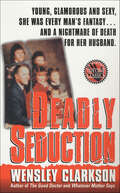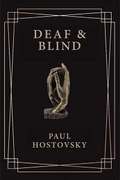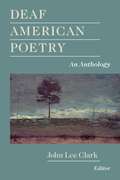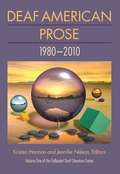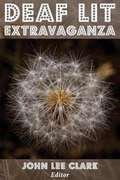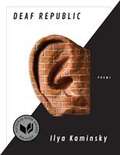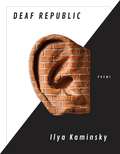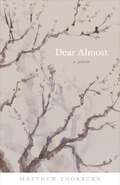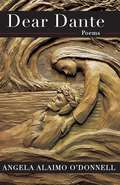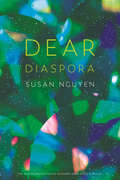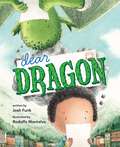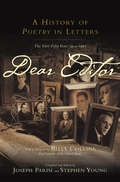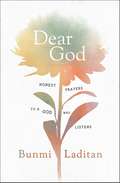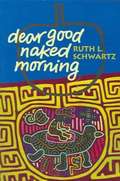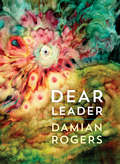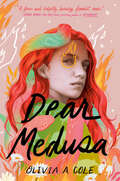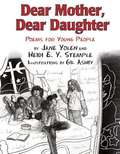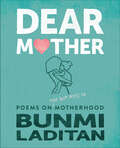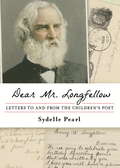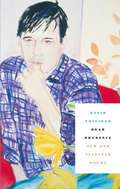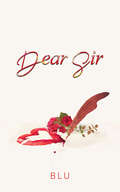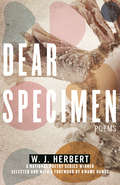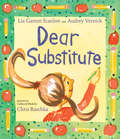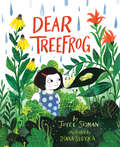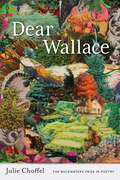- Table View
- List View
Deadly Seduction (St. Martin's True Crime Classics)
by Wensley Clarkson***Please note: This ebook edition does not contain the photos found in the print edition.***Young, Glamorous and Sexy, She Was Every Man's Fantasy...And A Nightmare of Death For Her Husband.She Hid Her Criminal Past...Prominent Indiana attorney Jimmy Grund thought he'd found the woman of his dreams when he wed his second wife Susan. But beneath the silky blond society lady lurked a calculating, evil-tempered seductress whose murderous future was about to rival her sordid past.She Plotted A Brutal Murder...While she hid her previous marriages and an appalling crime from Jimmy, she was soon plotting to get her hands on his fortune. When Jimmy Grund finally found out the truth about his wife, he told her he was divorcing her. But no one left Susan Grund.She Killed Her Husband With A Gun Stolen From His Own Son...All of Peru, Indiana was stunned when it was revealed the fatal bullet came from a gun stolen from young David Grund. Yet even that paled next to Susan's incredible testimony that she had carried on a two-year affair with the innocent teenager, who denied the affair and was not implicated in the crime.Wensley Clarkson's Deadly Seduction is the story of a real femme fatale, who spun a web of deceit and murder that shocked an entire town.
Deaf & Blind
by Paul HostovskyA collection of poems and stories about Deaf and DeafBlind people, ASL and Braille.
Deaf American Poetry: An Anthology
by John Lee Clark<p>“The Deaf poet is no oxymoron,” declares editor John Lee Clark in his introduction to <i>Deaf American Poetry: An Anthology</i>. The 95 poems by 35 Deaf American poets in this volume more than confirm his point. From James Nack’s early metered narrative poem “The Minstrel Boy” to the free association of Kristi Merriweather’s contemporary “It Was His Movin’ Hands Be Tellin’ Me,” these Deaf poets display mastery of all forms prevalent during the past two centuries. Beyond that, E. Lynn Jacobowitz’s “In Memoriam: Stephen Michael Ryan” exemplifies a form unique to Deaf American poets, the transliteration of verse originally created in American Sign Language. <p>This anthology showcases for the first time the best works of Deaf poets throughout the nation’s history — John R. Burnet, Laura C. Redden, George M. Teegarden, Agatha Tiegel Hanson, Loy E. Golladay, Robert F. Panara, Mervin D. Garretson, Clayton Valli, Willy Conley, Raymond Luczak, Christopher Jon Heuer, Pamela Wright-Meinhardt, and many others. Each of their poems reflects the sensibilities of their times, and the progression of their work marks the changes that deaf Americans have witnessed through the years. In “The Mute’s Lament,” John Carlin mourns the wonderful things that he cannot hear, and looks forward to heaven where “replete with purest joys/My ears shall be unsealed, and I shall hear.” In sharp contrast, Mary Toles Peet, who benefitted from being taught by Deaf teachers, wrote “Thoughts on Music” with an entirely different attitude. She concludes her account of the purported beauty of music with the realization that “the music of my inward ear/Brings joy far more intense.” <p>Clark tracks these subtle shifts in awareness through telling, brief biographies of each poet. By doing so, he reveals in <i>Deaf American Poetry</i> how “the work of Deaf poets serves as a prism through which Deaf people can know themselves better and through which the rest of the world can see life in a new light.”</p>
Deaf American Prose, 1980–2010
by Jennifer L. Nelson Kristen C. HarmonIn Deaf life, the personal narrative holds sway because most Deaf individuals recall their formative years as solitary struggles to understand and to be understood. Few deaf people in the past related their stories in written form, relying instead on a different kind of "oral" tradition, that of American Sign Language. During the last several decades, however, a burgeoning bilingual deaf experience has ignited an explosion of Deaf writing that has pushed the potential of ASL-influenced English to extraordinary creative heights. Deaf American Prose: 1980-2010 presents a diverse cross-section of stories, essays, memoirs, and novel excerpts by a remarkable cadre of Deaf writers that mines this rich, bilingual environment. The works in Deaf American Prose frame the Deaf narrative in myriad forms: Tom Willard sends up hearing patronization in his wicked satire "What Exactly Am I Supposed to Overcome?" Terry Galloway injects humor in "Words," her take on the identity issues of being hard of hearing rather than deaf or hearing. Other contributors relate familiar stories about familiar trials, such as Tonya Stremlau's account of raising twins, and Joseph Santini's short story of the impact on Deaf and hearing in-laws of the death of a son. The conflicts are well-known and heartfelt, but with wrinkles directly derived from the Deaf perspective. Several of the contributors expand the Deaf affect through ASL glosses and visual/spatial elements. Sara Stallard emulates ASL on paper through its syntax and glosses, and by eliminating English elements, a technique used in dialogue by Kristen Ringman and others. Deaf American Prose features the work of other well-known contemporary Deaf writers, including co-editor Kristen Harmon, Christopher Jon Heuer, Raymond Luczak, and Willy Conley. The rising Deaf writers presented here further distinguish the first volume in this new series by thinking in terms of what they can bring to English, not what English can bring to them.
Deaf Lit Extravaganza
by John Lee ClarkThis celebration of short stories, poems, and essays gives us a glimpse into the Deaf signing community, something that literature by hearing authors featuring deaf characters has rarely done. Between these covers, a Deaf couple fights over their son's language use, an Australian woman joins the community as an adult, a Deaf woman's body is fished out a dumpster, and a British Deaf poet wants to keep "zombies"-hearing people-out.
Deaf Republic: Poems
by Ilya KaminskyFinalist for the National Book Award*Finalist for the PEN/Jean Stein Award*Finalist for the National Book Critics Circle Award* Winner of the Los Angeles Times Book Prize*Winner of the Anisfield-Wolf Book Award*Winner of the National Jewish Book Award*Finalist for the Kingsley Tufts Poetry Award *Finalist for the T. S. Eliot Prize* Finalist for the Forward Prize for Best Collection Ilya Kaminsky's astonishing parable in poems asks us, What is silence? This book opens in an occupied country in a time of political unrest. When soldiers breaking up a protest kill a deaf boy, Petya, the gunshot becomes the last thing the citizens hear--they all have gone deaf, and their dissent becomes coordinated by sign language. The story follows the private lives of townspeople encircled by public violence: a newly married couple, Alfonso and Sonya, expecting a child; the brash Momma Galya, instigating the insurgency from her puppet theater; and Galya's girls,heroically teaching signing by day and by night luring soldiers one by one to their deaths behind the curtain. At once a love story, an elegy, and an urgent plea, Ilya Kaminsky's long-awaited Deaf Republic confronts our time's vicious atrocities and our collective silence in the face of them.
Deaf Republic: Poems
by Ilya KaminskyFinalist for the National Book Award • Finalist for the PEN/Jean Stein Award • Finalist for the National Book Critics Circle Award • Winner of the Los Angeles Times Book Prize • Winner of the Anisfield-Wolf Book Award • Winner of the National Jewish Book Award • Finalist for the Kingsley Tufts Poetry Award • Finalist for the T. S. Eliot Prize • Finalist for the Forward Prize for Best CollectionIlya Kaminsky’s astonishing parable in poems asks us, What is silence?Deaf Republic opens in an occupied country in a time of political unrest. When soldiers breaking up a protest kill a deaf boy, Petya, the gunshot becomes the last thing the citizens hear—they all have gone deaf, and their dissent becomes coordinated by sign language. The story follows the private lives of townspeople encircled by public violence: a newly married couple, Alfonso and Sonya, expecting a child; the brash Momma Galya, instigating the insurgency from her puppet theater; and Galya’s girls, heroically teaching signing by day and by night luring soldiers one by one to their deaths behind the curtain. At once a love story, an elegy, and an urgent plea, Ilya Kaminsky’s long-awaited Deaf Republic confronts our time’s vicious atrocities and our collective silence in the face of them.
Dear Almost: A Poem (Barataria Poetry)
by Matthew ThorburnDear Almost is a book-length poem addressed to an unborn child lost in miscarriage. Beginning with the hope and promise of springtime, poet Matthew Thorburn traces the course of a year with sections set in each of the four seasons. Part book of days, part meditative prayer, part travelogue, the poem details a would-be father's wanderings through the figurative landscapes of memory and imagination as well as the literal landscapes of the Bronx, Shanghai, suburban New Jersey, and the Japanese island of Miyajima. As the speaker navigates his days, he attempts to show his unborn daughter "what life is like / here where you ought to be / with us, but aren't." His experiences recall other deaths and uncover the different ways we remember and forget. Grief forces him to consider a question he never imagined asking: how do you mourn for someone you loved but never truly knew, never met or saw? In candid, meditative verse Dear Almost seeks to resolve this painful question, honoring the memory of a child who both was and wasn't there.
Dear Dante: Poems
by Angela Alaimo DonnellAn imagined conversation with Dante Alighieri written in response to the 700th anniversary of Dante's death by fellow Catholic poet, lover and master of the sonnet, Angela Alaimo O'Donnell. In the summer of 2021, Angela Alaimo O'Donnell honored the 700th anniversary of Dante's death, by embarking on a three-month pilgrimage through the 100 cantos of The Divine Comedy, reading one canto per day. This new collection, Dear Dante, is her response to Dante's epic poem: 39 poems (13 for each of the 3 canticles), plus an additional 3 to serve as prologue and epilogue, all written in the poetic forms Dante loved best: the sonnet and the form he invented, terza rima. In O'Donnell's words: "Dear Dante is a species of accompaniment, an act of homage, and a long love letter to Dante. It might also be read as a series of meditations that attest to how dear Dante is to us. The Commedia is our inheritance, a gift granted to readers by our brother poet 700 years ago. These poems are an admittedly small expression of gratitude for that grand and graced gift. Grazie Mille, Maestro."
Dear Diaspora (The Raz/Shumaker Prairie Schooner Book Prize in Poetry)
by Susan NguyenDear Diaspora is an unapologetic reckoning with history, memory, and grief. Parting the weeds on a small American town, this collection sheds light on the intersections of girlhood and diaspora. The poems introduce us to Suzi: ripping her leg hairs out with duct tape, praying for ecstasy during Sunday mass, dreaming up a language for buried familial trauma and discovering that such a language may not exist. Through a collage of lyric, documentary, and epistolary poems, we follow Suzi as she untangles intergenerational grief and her father&’s disappearance while climbing trees to stare at the color green and wishing that she wore Lucy Liu&’s freckles. Winner of the Raz/Shumaker Prairie Schooner Book Prize in Poetry, Dear Diaspora scrutinizes our turning away from the trauma of our past and our complicity in its erasure. Suzi, caught between enjoying a rundown American adolescence and living with the inheritances of war, attempts to unravel her own inherited grief as she explores the multiplicities of identity and selfhood against the backdrop of the Vietnamese diaspora. In its deliberate interweaving of voices, Dear Diaspora explores Suzi&’s journey while bringing to light other incarnations of the refugee experience.
Dear Dragon: A Pen Pal Tale
by Josh FunkA sweet and clever friendship story in rhyme, about looking past physical differences to appreciate the person (or dragon) underneath.George and Blaise are pen pals, and they write letters to each other about everything: their pets, birthdays, favorite sports, and science fair projects. There&’s just one thing that the two friends don&’t know: George is a human, while Blaise is a dragon! What will happen when these pen pals finally meet face-to-face?"When I was a kid, my best friend was Josh Funk. Now he's becoming a friend to a whole new generation.&”--B.J. Novak, author of The New York Times bestseller The Book With No Pictures
Dear Editor: A History of Poetry in Letters
by Billy Collins Stephen Young Joseph ParisiPoignant, hilarious, and brutally frank, Dear Editor reveals the personalities and untold stories behind the creation of modern poetry. "The history of poetry and Poetry in America are almost interchangeable, certainly inseparable," A. R. Ammons wrote. Dear Editor, in gathering over 600 surprisingly candid letters to and from the editors of Poetry, traces the development of poetry in America: Ezra Pound's opinion of T. S. Eliot ("It is such a comfort to meet a man and not have to tell him to wash his face, wipe his feet") and of Robert Frost ("dull as ditch water...[but] set to be 'literchure' someday"); Edna St. Vincent Millay's pleas for an advance ("I am become very, very thin, and have taken to smoking Virginia tobacco"); Wallace Stevens on himself ("I have a pretty well-developed mean streak"). Here are the inside stories, the rivalries between aspiring authors, the inspirations behind classics, the practicalities (and politicking) of publishing. In fascinating anecdotes and literary gossip, scores of poets offer insights into the creative process and their reactions to historic events.
Dear God: Honest Prayers to a God Who Listens
by Bunmi LaditanDear God is a poignant collection of funny, often heartbreaking, and deeply insightful letters to God that bravely share the emotions we all feel as we grapple with this broken world and search for divine love. With the same gutsy and poetic honesty that charmed readers around the world, Bunmi now shares prayers and poems that chart her faith journey toward reconnecting with the God she loved, lost, and realized had never left her side even while she wandered. These candid fieldnotes will stir your heart and make you laugh out loud with Bunmi's self-aware humor and profound insight into the spiritual journey we're all trying to navigate. Join Bunmi as she journeys through emotions we all experience--doubt, anger, joy, desperation, love, loneliness, and gratefulness. Wittingly fresh and stunningly relatable, she exquisitely names our fears, voices our painful questions, and bravely says what we're all thinking anyway in our prayerful wrestling with God. For those who find themselves thirsting for something more, those who seek to reconnect with God, or those who really don't know what they believe but appreciate a good word, this poignant collection of prayers is a strengthening reminder that the same Love that rises and sets the sun cares for you with particular affection.
Dear Good Naked Morning
by Ruth L. SchwartzIncludes: Come with Me Photograph of the Child Letter from Ellis Pond Sex Words Palimpsest The Lost and Physical World Trees in Wind Love Poem for the Past December 31 Mud Season Versions of Chalib: Chazal I ...Chazal II ...Chazal V Crass Highway Five Love Poem Tangerine Walking in Winter Ceremony Fifth Street Love Poem Music for Guitar and Stone Perseid Letters Addressed to Love Tener Springtime in the Central Valley Green Fuse
Dear Leader
by Damian RogersI'm ill-equipped for this. I sit by a fake fireplace that frames a real flame. I've been crossed by two crows today. 'Multi-vectored, Rogers's poems hum with life and tension, their speaker poised as mother, seer, reporter and daughter. They speak of loss and cold realities (misplaced charms of luck, a tour of an assisted-living facility, coins thrown into Niagara Falls). They also interweave dreams and visions: "O Lion, I am / an old handmaiden; I will not lay the pretty baby in the lap / of the imposter." Simple but evocative, at once strange and plain, Rogers's poems of address ricochet off the familiar "Dear Reader" or Dickinson's "Dear Master" ... Rogers's poems provide instructions for what to leave, what to take and what to fight. They act as selvage between the vast mother-ocean -- the mem of memory -- and the fabric we make of the uncertain in-between.' -- Hoa Nguyen, The Boston Review 'How can we live with the kind of pain that worsens each day? Dear Leader explains through bold endurance, enumerated blessings and the artistic imagination. By pasting stark truths over, or under, images of strange, compelling beauty, Rogers creates a collage, a simulation of the human heart under assault, bleeding but unbroken. Part Orpheus, part pop-heroine who can "paint the daytime black," all, an original act of aesthetic violence and pure, dauntless, love.' -- Lynn Crosbie Praise for Paper Radio: 'Paper Radio jumped out at me and I can't say why, but that's what you want poetry to do, and I never want to say why. Because it's real and talking to me. Because it's bloody and horrifying beauty. It's the Clash and Buckminster Fuller, Auden and Bowie.'-- Bob Holman
Dear Medusa: (A Novel in Verse)
by Olivia A. ColeThis searing and intimate novel in verse follows a sixteen-year-old girl coping with sexual abuse as she grapples with how to reclaim her story, her anger, and her body in a world that seems determined to punish her for the sin of surviving. <P><P> Sixteen-year-old Alicia Rivers has a reputation that precedes her. But there’s more to her story than the whispers that follow her throughout the hallways at school—whispers that splinter into a million different insults that really mean: a girl who has had sex. But what her classmates don’t know is that Alicia was sexually abused by a popular teacher, and that trauma has rewritten every cell in her body into someone she doesn’t recognize. To the world around her, she’s been cast, like the mythical Medusa, as not the victim but the monster of her own story: the slut who asked for it. <P><P> Alicia was abandoned by her best friend, quit the track team, and now spends her days in detention feeling isolated and invisible. When mysterious letters left in her locker hint at another victim, Alicia struggles to keep up the walls she’s built around her trauma. At the same time, her growing attraction to a new girl in school makes her question what those walls are really keeping out.
Dear Mother, Dear Daughter
by Jane Yolen Heidi E. Y. StempleAs she grows up, a girl faces issues and events that are confusing, worrisome, and challenging. Who best to offer advice and comfort than her mother? In 17 pairs of sensitive verse, poets Jane Yolen and Heidi Stemple -- real-life mother and daughter -- exchange their thoughts on a variety of adolescent issues great and small, such as homework, messy bedrooms, lengthy telephone calls, the death of a grandparent, and schoolgirl crushes. In these compelling poems, created as notes to each other, both daughter and mother communicate their feelings about issues and ideas that virtually every family faces, bringing generations together in mutual respect.
Dear Mother: Poems on the Hot Mess of Motherhood
by Bunmi LaditanThe USA Today–bestselling author of Confessions of a Domestic Failure and Toddlers Are A**holes shares poetry on the ups and downs of being a mom.The first collection of poetry from Bunmi Laditan, bestselling author of Confessions of a Domestic Failure and creator of The Honest Toddler, capturing the honesty, rawness, sheer joy and total madness of motherhood. With the compassion and wit that have made her a social media sensation among mothers around the world, Bunmi Laditan puts into evocative and relatable words what so many of us feel but can’t quite express. For mothers who love their children with a fiery fierceness but know what it is to feel crushed at the end of those long days, Dear Mother is like a warm hug that says, “I get it.”
Dear Mr. Longfellow
by Sydelle PearlA charming biography that brings to life a famous figure of American literature and a distant, simpler age in the history of our country. If you were attending school in the late-nineteenth century, it's very likely that your teacher would have taught you to memorize lines from "The Village Blacksmith" by renowned poet Henry Wadsworth Longfellow. And on the classroom wall you'd probably see his portrait looking down benignly on you and your classmates. Longfellow was so famous and beloved by youth in this era that he was known as "the children's poet." Students not only memorized his poetry but even knew where his house was in Cambridge, Massachusetts. Children in the vicinity often visited him, and from all over the country they wrote him hundreds of letters. A storyteller and author recounts the life of Henry Wadsworth Longfellow by drawing upon the letters he received from his young admirers. In their letters, children from yesteryear reveal details about their lives that reach across the years to young people today. The letters also highlight the unique, close relationship that children shared with Longfellow. A girl from West Virginia writes, "Thank you so much for writing for children.... It makes us feel that we are not forgotten." Others ask him about what he did as a boy or a young man. In one extraordinary gesture of friendship, the schoolchildren of Cambridge celebrated his birthday by presenting him with a chair created from the wood of the "spreading chestnut tree" made famous in his poem "The Village Blacksmith." Longfellow dedicated his poem "From My Arm-Chair" to these thoughtful children.
Dear Prudence
by David Trinidad"This magnum opus confirms David Trinidad's place in the poetic firmament: he is simply the best we have. A worthy successor to James Schuyler, Trinidad writes soulfully and sometimes photorealistically about the melancholy threshold where dolls and stars become inner objects--dirty, glamorous, destructible. Jacqueline Susann meets Sei Shonagon? Trinidad manages to combine neo-formalist abstraction with dripping gorgeous figuration: Bonnard's wet dream."--Wayne Koestenbaum "This is a volume celebratory in tone, panoramic in scope, funny, and genuinely moving. Trinidad is at the center of what's relevant in his art. And this collection is more vital and more enjoyable than any single performance he has given thus far."--D.A. Powell "Trinidad attends to the present to see into the past with such needle point precision it's like encountering a perfectly appointed movie set where personal memory crosses intimately with cultural memory. Poetic form in Trinidad's hands is a metaphor for staking a claim on the material world even as it slips away in a shimmery Hollywood dissolve--a desperate, doomed reclamation of all that can never be held long enough."--Robyn Schiff "Utterly deadpan and astonishingly fine" is how Publishers Weekly described the poems of David Trinidad. And here is the collection all David Trinidad fans have been waiting for--the first book to have works from all his previous books along with forty new poems: Dear Prudence: New and Selected Poems.
Dear Sir
by Blu…till you receive post Truly inspiring letters, which are double-purposed as poems, are written in the most elegant but modern style, revealing the greatest love in the world: companionship between man and woman.
Dear Specimen: Poems
by W.J. HerbertA National Poetry Series winner, selected and with a foreword by Kwame Dawes.A 5-part series of interwoven poems from a dying parent to her daughter, examining the human capacity for grief, culpability, and love, asking: do we as a species deserve to survive? Dear Specimen opens with both its speaker and her planet in peril. In &“Speak to Me,&” she puzzles over a millipede, as if the blue rune of its body could help her understand her impending death and the crisis her species has created. Throughout the collection, poems addressed to specimens echo the speaker&’s concern and amplify her wonderment. A catalog of our climate transgressions, Dear Specimen&’s final poem foretells a future in which climate refugees overrun one of our planet&’s last habitable places. The collection&’s lifeblood is a series of poems in which the speaker and her daughter express their concern for, and devotion to, one another. The daughter&’s questions mirror the ones her mother asks of specimens: what are we meant to do with so much hazard and wonder? When the speaker hints at the climate crisis in a bedtime story she tells her grandson, we, too, feel the peril he may face. Juxtaposing a profound sense of intimacy with the vastness of geological time, the collection offers a climate-conscious critique of the human species—our search for meaning and intimacy, our capacity for greed and destruction. Dear Specimen is an extended love letter and dire warning, not only to the daughter its speaker leaves behind but to all of us.
Dear Substitute (Hyperion Picture Book (eBook))
by Liz Garton Scanlon Audrey VernickWhen a substitute teacher named Miss Pelly comes to class, one student bristles at the change in routine-Miss Pelly doesn't follow the rules like Mrs. Giordano. But in time, our student learns that even though the substitute may do things a little differently, and she may be a bit silly, mixing things up might not be so bad. Told in a series of epistolary poems, this funny, relatable picturebook is a great fit for classrooms and for any child nervous about new experiences.
Dear Treefrog
by Joyce SidmanCapturing the joy of finding a kindred spirit, this stunning picture book by Newbery Honor–winning poet Joyce Sidman tells the story of a lonely girl moving into a new home and the little treefrog that helps her connect to the beautiful world around her. Perfect for fans of A Butterfly Is Patient and They Saw a Cat.I See You suddenly among the tangled green a tiny dollop of frog where before there was only leaf . . . Are you new here too? When a shy girl moves to a strange new home, she discovers a treefrog perched in a secret spot nearby and learns that sometimes, all it takes to connect with the people and the world around us is a little patience, a curious mind, and a willingness to see the world through a different perspective than your own. With beautiful gouache illustrations by Diana Sudyka and magical, perceptive poems from Newbery Honor–winning author Joyce Sidman, the lives of one tree frog and the girl who discovers it converge, bringing solace, courage, and joy in finding a kindred spirit.
Dear Wallace (The Backwaters Prize in Poetry)
by Julie ChoffelWinner of the Backwaters Prize in PoetryDear Wallace addresses the poet and insurance executive Wallace Stevens in an attempt to reconsider art, power, and creativity amid the demands of everyday responsibility. Exploring relationships between modernism, motherhood, poetry, and privilege, the speaker of these poems puts her daily routines in dialogue with his. Curious, funny, and wry, Julie Choffel confronts Stevens as an unlikely peer who lived and wrote in the same city and weather as she does now, imagining a present-day conversation about the many ways creative practice is informed by social context. As we struggle to marry creative independence with our communal obligations, the questions in these poems are more urgent than ever. Stevens, a proxy for beauty, inventiveness, and legitimacy, becomes an audience for the ennui, anxiety, and politics of care that characterize another kind of writer&’s life today.
